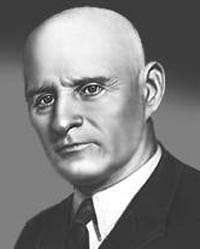Aleksey Chapygin
Aleksey Pavlovich Chapygin (Russian: Алексе́й Па́влович Чапы́гин; 17 October [O.S. 5 October] 1870 - 21 October 1937) was a Russian writer, and one of the founders of the Soviet historical novel.[1]
Aleksey Chapygin | |
|---|---|
 | |
| Born | October 17, 1870 Kargopol Uyezd, Olonets Governorate, Russia |
| Died | October 21, 1937 (aged 67) Leningrad, USSR |
Biography
Chapygin was born in Kargopol Uyezd, Olonets Governorate. His northern peasant origins are reflected in his works.[1] His first book of stories, Those Who Keep Aloof, and his novel The White Hermitage, describing northern life, were published before the Russian Revolution of 1917.[2] He is best known for his two novels about peasant uprisings in the 17th century, Itinerant Folk (1934–37) and Stepan Razin (1926–27). Stepan Razin is considered a classic of Soviet literature.[1]
Chapygin drew upon Russian folklore for both the style of Stepan Razin and the positive and romanticized portrait of Razin himself. The Soviets excused this modernization of history as a justifiable polemic against the negative portrayal of Razin in 19th-century Russian literature.[1] Stepan Razin was published in the magazine Red Virgin Soil.[3]
English translations
- Stepan Razin, Hutchinson International Authors, Ltd., London, 1946.
External links
- Biography (in Russian)
- Aleksey Chapygin Razin Stepan (in Russian)
References
- Columbia Dictionary of Modern European Literature, Bédé, Edgerton, Columbia University Press, 1980.
- 25 Years of Soviet Russian Literature (1918-1943), Gleb Struve, Taylor & Francis, 1944.
- Red Virgin Soil: Soviet Literature in the 1920s, Robert A. Maguire, Northwestern University Press, 2000.